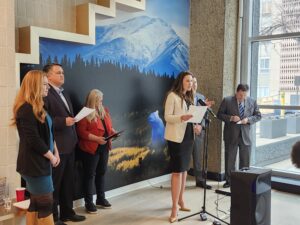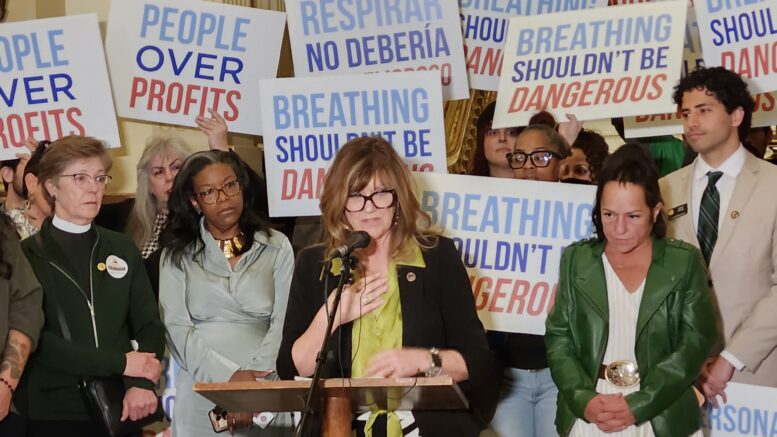Legislators looking to ramp up both regulations against air-quality violators and the enforcement of those laws advanced two major pieces of legislation Wednesday, despite warnings that they could lead to economic upheaval and shutdowns of large employers.
During a 10-hour hearing that stretched nearly to midnight, the Senate Transportation and Energy Committee approved two of the three bills that sprang from the Legislative Interim Committee on Ozone Quality. A House committee two weeks ago advanced the third, despite concerns on all three bills from members of Gov. Jared Polis’ administration over the costs and effectiveness of the new proposals — concerns that will continue to serve as obstacles for the bills.
All the bills come as Colorado remains in severe nonattainment of U.S. Environmental Protection Agency ozone limits in an area stretching from Douglas County north to Weld County. The status will require gas stations in the area to sell high-priced reformulated gasoline this summer and will force emissions regulations on more types of businesses.
Senate Bill 165 would take a multi-pronged approach to reducing air pollutants, most notably requiring a pause in oil-and-gas pre-production activities such as well-pad building and fracking in the high-ozone season of June through August. It also would codify Polis’ executive order for drillers to reduce nitrous oxide emissions, create a publicly accessible emissions database, require the state to set falling emissions budgets for the transportation sector and launch rulemaking for on- and off-road engines.
What the air-quality bills would do
SB 166 would label companies with five air-quality violations over a three-year period as repeat violators and subject them to fines no less than 50% of the maximum civil penalty that is allowed. It also would require high-priority repeat violators to conduct root-cause analyses of their violations and reduce emissions of certain pollutants by 5% the next year, and it would allow citizens to file civil lawsuits against alleged violators.
The bills sprang from two primary concerns expressed by air-quality activists and progressive legislative Democrats whose efforts already have led to the passage of some 80 new environmental-protection laws since 2019, as well as several major rulemakings. Prominent groups such as Earthjustice and the Sierra Club say that the specific regulations put in place by Polis’ government have not cut emissions fast enough and need toughening, and they also say the state government is not enforcing laws as vigorously as it can.

Colorado state Sen. Kevin Priola talks about his air-quality bills in his Capitol office in February.
SB 166, sponsored by Democratic Sens. Faith Winter of Broomfield and Kevin Priola of Henderson, takes significant steps to deal with activists’ frustrations with the penalties that have been doled out by the Colorado Department of Public Health and Environment. Many activists complain specifically that fines are too light against Commerce City oil refinery Suncor Energy, whose recent $11 million penalty for pollution violations included orders to put $8 million of that total toward improving its control systems.
“Written in blood”
“When we’re asking for regulations, we need the regulations to be written in blood so we can finally get our equity,” said Rene Millard-Chacon, a Commerce City Councilwoman. “We must prioritize punishing the worst of the worst repeat offenders.”
But opponents said that both SB 166 and SB 165, sponsored by Priola and Democratic Sen. Lisa Cutter of Morrison, go way beyond ramping up regulations to become punitive attacks on industry. SB 165 is aimed almost solely at oil and gas despite a host of other sectors contributing to ozone problems, though SB 166’s new enforcement mandates will affect everything from manufacturers to pharmaceutical plants to data centers.
By forcing manufacturers and other emitters to face five-figure fines rather than working collaboratively with regulators to fix problems, SB 166 will destroy efforts by companies to try to improve their processes and lower their emissions, several business leaders said. And in the case of Evraz North America, the Pueblo facility, the proposal could lead to the plant’s closure, warned Annie Stefanec, director of communications and government affairs for the company.
Though Winter disputed that the bill would have such an effect, company leaders explained that many of the violations that would be mandated under SB 166 are now dismissed without fines because CDPHE works with them to fix issues and improve safety. A 66-horsepower motor for which Evraz forgets to get an annual tune-up could be subject to a fine of $11.5 million for a year’s worth of violations — the kind of impact that would disincentive future investments into the plant, environmental manager Jim Rodacy said.
“Out of business”
“We are looking down the barrel at policies that seek to cause injuries to businesses, families and communities in Southern Colorado,” Stefanec said. “I don’t think I’ve ever seen our team more engaged and more interested to fight back against a bill that is so terrible. It would put many people out of work. It would put the mill out of business.”
Responding to such criticism, sponsors of both bills added several key amendments during the hearings Thursday.
Priola and Cutter eliminated requirements in SB 165 for the Colorado Department of Transportation to propose a plan to reduce vehicle miles traveled statewide, nixed planned emissions-standard requirements for off-road diesel fuel fleets and cut out a portion of a proposed rulemaking to require indirect sources like warehouses to reduce emissions, with sponsors hinting they may cut the rulemaking requirement entirely. Another change cut the required pause in pre-production activities within the nonattainment area by two months, as it originally was proposed to last from May through September.
The remaining three-month shutdown of pre-production activity still will be crippling, industry leaders said — particularly because many oil fields are too far from the electric grid to take advantage of an exemption to the pause for drillers using electric equipment. Lengthy shutdowns in pre-production would make it more difficult for local companies to access the pricey technology that can help them to reduce emissions in new ways and would likely send oil-and-gas workers to other states, with many not returning, said Kait Schwartz, director for American Petroleum Institute Colorado.

Kait Schwartz, director of American Petroleum Institute Colorado, speaks about a slate of new environmental bills at a news conference in February.
Targeting oil and gas or air quality?
“I do not consider this legislation as a serious attempt to address Colorado’s ozone problem but another attempt to target our industry,” said Bill Groffy, director of legislative and regulatory affairs for the Colorado Oil & Gas Association. “By requiring our industry to pause operations during the ozone season … this bill is essentially a ban on oil and gas operations in Colorado.”
Priola said he targeted oil and gas because the sector is responsible for 35% of nitrous oxide emissions in the non-attainment area and 30% of volatile organic compounds. But Chris Colclasure, a Beatty & Wozniak shareholder, said that state records show the industry as being responsible for just 3% to 8% of actual ozone pollution and that restrictions are unlikely to make serious headway into cutting that pollution.
“It’s what the science says it is,” Priola explained. “We’re trying to prevent bad things and mitigate effects on public health.”
Winter and Priola, meanwhile, added several amendments to SB 166 to try to tamp down industry concerns about its punitive nature.
Changes to air-quality bills
The most significant specified that paperwork violations would not count against the tally of violations in determining repeat violators, specifying that the violations must be related to emissions-limit exceedances. It also stated that there must be five separate violations rather than five violations from one incident to generate the label and that the five violations must come from the same stationary source, not five scattered locations owned by a company.
There was significant debate about the impact of SB 166’s provision permitting citizens to file lawsuits against violators.
While opponents such as Rich Warner, president/CEO of Upstate Colorado Economic Development, called the allowance “a state-sponsored fund to litigate,” supporters said they expect those lawsuits to be few and far between. Ian Coghill, senior attorney for the Rocky Mountain office of Earthjustice, noted that the federal Clean Air Act allows such lawsuits, and yet only 31 have been filed in federal courts in the past five years.
Colclasure said, however, that the threat of a flood of lawsuits is real because it’s clear that some groups want to try to use the proposed law to eradicate an economic sector that they don’t believe should exist, despite its enormous economic impact on Colorado.
“Searching for ways to shut down oil and gas”
“Activists are searching for ways to shut down oil and gas, and this bill pays them to do that,” he said, pointing to provisions that allows district courts to award litigation costs to the complaining party if they prevail in court or reach a settlement. “These lawsuits won’t be about air quality, not really. These cases will be weaponized by groups trying to shut down oil and gas in Colorado.”
SB 165 cleared the committee on a 5-2, Democrat-led party-line vote, while SB 166 passed 4-3, with Democratic Sen. Nick Hinrichsen of Pueblo saying he’s not convinced that the bill’s sponsors achieved a balance between environmentalists and industry. Both bills now head to the Senate Finance Committee, which will examine not just their effects on the environment and economy but the proposed costs of the legislation to state government, which CDPHE officials have said is too low currently to allow proper enforcement.
Winter, however, said both bills are needed to clear Colorado’s air, particularly in poorer industrial-adjacent communities, in a way the state has failed to accomplish so far.
“We know that disproportionately impacted communities have taken on the burden of pollution for over 100 years since the Industrial Revolution,” Winter said. “And we know there are violators who take on the fines as the cost of doing business, and that’s not why we have laws.”
